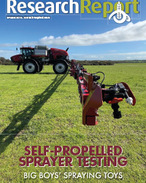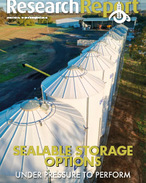Soil carbon sequestration in agricultural systems has gained tremendous momentum in the last year and is regarded by the Australian government as a win/win for farming communities and the climate.
Encouraged by the Clean Energy Regulator and through policy and national grants, soil carbon sequestration empowers farmers to leverage carbon as a potent resource to secure the future-stable productivity of their land and diversify farm income by entering the carbon trading market.
What carbon farming also means is embarking on a 25-year land management journey. By starting out on the right foot and utilising the most intelligent technology available to minimise error, calculate operational costs, prevent overspending and predict potential income as accurately as possible, producers can secure long-term maximum profits.
Manage carbon
Created to enable precisely this, and accelerate the Australian farming industry's access to the new income stream the carbon trading market has to offer, Carbon Count is the world's first commercially available online soil carbon project management software.
Designed for agricultural consultants, carbon farming project managers and carbon trading companies to service landholders with, Carbon Count is a complete, intuitive project management tool that offers regulatory compliant sampling design and measurement of soil carbon and farm emissions, capable of significantly simplifying the project management process and maximising the value of derived carbon credits from these projects.
What's so promising about this new software is that it's built on the Clean Energy Regulator's legislative framework for the Emissions Reduction Fund (ERF) - with other schemes and method integrations soon available.
This means users simply have to follow the steps in the platform to meet all regulatory requirements and reporting obligations necessary to register and operate their clients' soil carbon projects in Australia.
The Australian startup, spearheaded by renowned soil scientist and entrepreneur Philip Mulvey leading a team of experienced agronomists and programmers, promises that the Carbon Count platform performs all the complex mathematical equations necessary and produces all regulator compliant documentation needed to measure, value and certify soil carbon.
Mulvey is a core member of the Soil Carbon Industry Group and CMI's Soil Carbon Taskforce and brings over 40 years of experience in soil sciences and land repair.
The Australian soil carbon Agtech pioneer has high hopes for the business to vastly accelerate Australia's participation in the global carbon trading market.
"There's never been an easier way to manage a soil carbon project in Australia, possibly the world," says Mulvey.
"Our goal was to simplify the complicated process and empower farming communities to benefit from the new income stream the carbon trading market has to offer, whilst also improving the future productivity of their land through carbon farming practices. It's a win for the economy, a win for landholders, a win for natural capital and a win for the climate."
Powerful tool
At the heart of this intuitive program is the patented Fast Adaptive Algorithm for Soil Testing (FAAST); a predictive outcome algorithm that determines the most cost-effective sampling plan for any farm in any region.
Based on the random stratification methodology for soil sampling design, now the mandatory methodology for running soil carbon projects in Australia, the FAAST algorithm has been developed by a team at University of Sydney, led by Professor Alexander McBratney and supported by Phillip Mulvey, over a period of 13 years.
This powerful tool discovers the sweet spot for users where sampling costs and variance are optimised - generating the ideal sampling plan with the optimum number of sample locations required to maximise a project's return on investment, complete with a geo-referenced digital data package.
Whilst others allocate a flat number of sample points per hectare, FAAST is intelligent.
Selecting too many points will result in costly oversampling, selecting too few might result in a high error or variance.
Where the FAAST algorithm really shines is in its ability to recommend the optimum number of sample points for a given strata to ensure users are not penalised when factoring in the variance. The result is maximum returns for projects.
What currently takes soil carbon project managers over 150 hours of skilled work to perform, the FAAST algorithm completes within minutes - saving users a tremendous amount of time, staff and money.
Strengthened by professionals with domain knowledge in agronomy, farm systems and soil science, the Carbon Count team helps licensed partners maximise profits for their clients even further by also offering strategic support in developing effective carbon sequestration land management practices.
The platform itself is able to produce several insightful farm maps including carbon distribution maps and pH variability maps.
Since publicly launching last month, Carbon Count is growing fast with several dozen farms currently running soil carbon projects via the expanding national and international partner ecosystem.
Whilst platform access is now available for all farmers via licensed agricultural consultants, project managers and carbon traders, large scale farmers may choose to access the platform directly by becoming a partner.
To find out more about platform capabilities, become a licensed partner or choose a partner that best suits your needs, visit www.carboncount.com
ABOUT THIS COMPANY
Carbon Count
An intelligent online soil carbon project management platform that enables you to easily measure and certify the value of carbon in your project area.
HEAD OFFICE:
- Level 1, 98 Maribyrnong Street, Footscray, Vic - 3011,
Australia - Phone: +61383305625
- Website: www.carboncount.com
- Email: info@carboncount.com

























